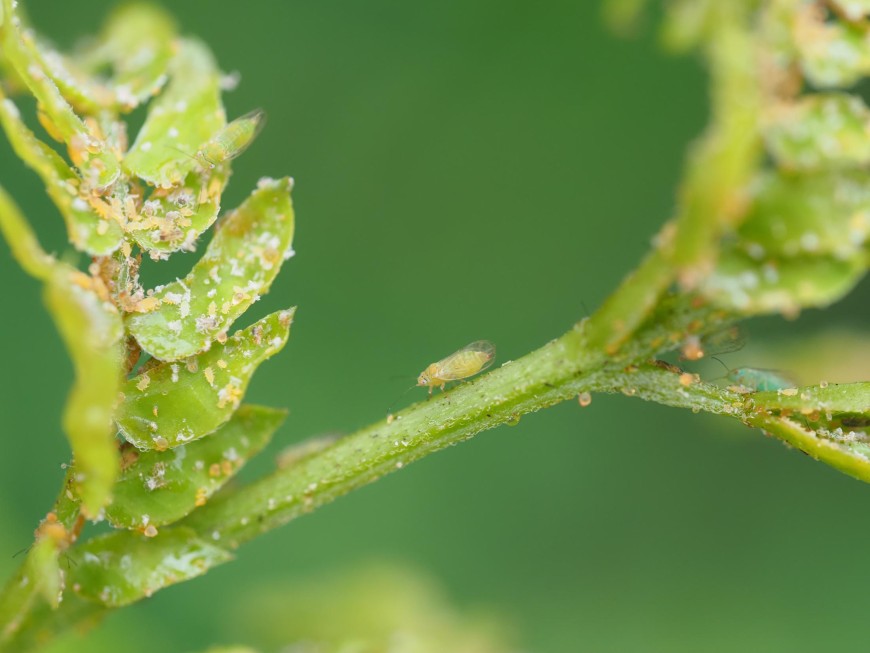A First for Tuvalu
Image: collecting psyllid nymphs to release.
Although one of the tiniest nations in the Pacific, Tuvalu still has its fair share of weed problems. Addressing invasive species issues has been acknowledged as a key step towards strengthening the resilience of Pacific communities that are already beginning to experience the impacts of climate change.
In March 2022 a stakeholder workshop to determine priorities was held in Funafuti, the capital of Tuvalu. It was agreed that leucaena (Leucaena leucocephela), or tamalini as it is called there, should be a top priority to target with natural enemies. In Tuvalu, leucaena was deliberately introduced to Vaitupu atoll for soil improvement and accidentally to Funafuti atoll in soil contaminated with the seeds. It has subsequently become very weedy on both islands.
Image: Leucaena in Tuvalu.
Leucaena is native to Central America and has been widely introduced across the Pacific as an agroforestry crop. However, it has quickly become an aggressive invader in many tropical and sub-tropical regions and is listed in the top 100 of the world’s worst invasive species. In New Zealand leucaena is currently only recorded at a small number of sites in the Auckland region but may become more problematic in the future.
Leucaena can quickly outcompete and replace other vegetation, forming dense, impenetrable thickets that disrupt natural successional processes. Coastal areas, semi-natural areas, roadsides, waste ground, plantations, hedgerows, recreational areas, and agricultural land are all at risk. Biodiversity is reduced, and ecological processes such as nutrient cycling and soil chemistry are affected. Leucaena can also be toxic to animals and reduce growth in pigs. Its ability to rapidly colonise newly disturbed areas makes it particularly well suited to take advantage of changing environmental conditions, including those caused by climate change, so its harmful impacts are expected to increase in the future.
Leucaena is difficult and expensive to control with conventional methods. It has a large root mass that can resprout vigorously if the plant is cut off at ground level, so additional treatments such as herbicide or a cutter bar operating below ground level are required to ensure plant death.
“Fortunately, there is an easier solution in the shape of a tiny, sap-sucking psyllid (Heteropsylla cubana)”, said Lynley Hayes, leader of the Pacific NENS programme. This leaf-feeding psyllid is native to tropical America but has self-established throughout much of the Pacific following the spread of its host plant, leucaena. However, it has not yet found its way to some of the more remote islands. The psyllid only attacks plants in the Leucaena genus. Both nymphs and adults feed on, and damage, the soft new growing tips of leucaena, which can cause severe tree stunting and the death of seedlings. They insert their needle-like mouthparts into the leaf tissue and suck out the fluids, which causes leaf shrivelling and defoliation. Plants infested with psyllids look as if breadcrumbs have been sprinkled on their leaves. This is due to a mixture of the life stages: white skins shed during moulting, and honeydew droplets produced by the psyllids during feeding.

Image: adult psyllid
Because the psyllid can be so damaging, hybrid forms of leucaena have been developed that are resistant to the psyllid. This meant the first thing to check was whether leucaena in Tuvalu is susceptible. Leucaena seeds were sent from Tuvalu and grown in our Auckland containment facility. “We collected some psyllids from Rarotonga in the Cook Islands in 2023 and it was quickly obvious that the psyllids could attack the material from Tuvalu. We were able to establish a colony on these plants and within a few weeks their damage potential was noticeable,” said research technician Stephanie Morton. No additional host testing was needed for Tuvalu, so the remaining step was to get clearance that the psyllids had a clean bill of health, and to apply for permission to introduce them.
Image: transferring nymphs onto plants.
With all steps completed early in 2024, the psyllids were released on Funafuti in April with the assistance of Tuvalu’s National Invasive Species Co-ordinator, Sam Panapa. “We are happy to be able to benefit from this natural enemy and to manage more weeds through this technique in the future,” said Sam. “This method is safer than using chemicals and more cost effective.” The psyllid’s establishment success and post-release impact in Tuvalu will be closely monitored.
This project is funded by New Zealand’s Ministry of Foreign Affairs and Trade as part of the Managing Invasive Species for Climate Change Adaptation in the Pacific (MISCCAP) programme, and by the GEF-6 Regional Invasives Project. The NENS programme is supported by the Pacific Regional Invasive Species Management Support Service.

